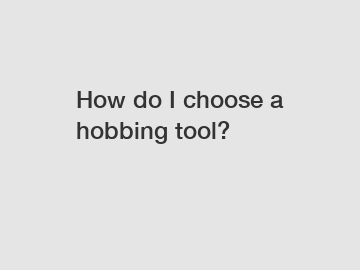How do I choose a hobbing tool?
Choosing the right hobbing tool is crucial for achieving precision and efficiency in gear manufacturing processes. With numerous options available in the market, it can be quite daunting to make the right selection. In this blog, we will guide you through the process of choosing a hobbing tool that best suits your requirements, ensuring optimal performance and profitability.
1. Understanding the Basics of Hobbing:
Before delving into the factors to consider when selecting a hobbing tool, it is important to have a basic understanding of hobbing itself. Hobbing is a machining process used to cut teeth into a workpiece, typically gears or splines. The hobbing tool is a cylindrical-shaped cutting tool that removes material to produce the desired tooth profile.

2. Analyzing the Workpiece Requirements:
The first step in choosing a hobbing tool is to thoroughly analyze the workpiece requirements. Consider the material, size and type of gear, required tooth profile accuracy, and the production volume. Each of these factors plays a crucial role in determining the appropriate hobbing tool.
3. Material Selection:
The type of material being machined will greatly influence the choice of hobbing tool. Different materials require specific cutting conditions and tool coatings. For example, hardened materials may necessitate the use of specialized coatings to improve tool life and performance. Understanding the properties of the workpiece material is fundamental in selecting the most appropriate hobbing tool.
4. Tooth Profile Accuracy:
The accuracy of the tooth profile depends on both the hobbing machine and the tool. Hobbing machines have strict limitations on the achievable tolerances, so it is important to choose a tool that can deliver the required accuracy. Tools made with high-quality materials and precision manufacturing techniques tend to provide better surface finishes and tooth profile accuracy.
5. Cutting Speed and Feed Rate:
The choice of cutting speed and feed rate will impact both the tool life and productivity. Optimal cutting conditions depend on factors such as the material being machined, horsepower capabilities of the machine, and the desired production rate. Selecting a hobbing tool that can withstand the required cutting conditions while providing good chip evacuation is vital for achieving efficient and cost-effective production.
6. Tool Coatings:
Tool coatings are crucial for enhancing tool life, improving surface finish, and reducing friction and built-up edge. PVD and CVD coatings are commonly used in hobbing tools. PVD coatings offer high hardness and wear resistance, while CVD coatings provide excellent heat resistance. Understanding the unique benefits of different tool coatings will help in making an informed decision.
7. Reliability and Durability:
Hobbing tools need to endure high cutting forces, making reliability and durability key factors to consider. Tools manufactured by reputable companies with a strong track record for quality and performance tend to offer greater reliability, longer tool life, and reduced machine downtime.
8. Seek Expert Advice:
To make an educated decision, it is advantageous to consult with experts in the field. Reach out to reputable tool manufacturers, industry professionals, or even conduct online research to gather insights and recommendations. Their expertise can help you select the most suitable hobbing tool based on your specific requirements.
Conclusion:
Choosing the right hobbing tool is critical for achieving efficient and precise gear manufacturing. By understanding your workpiece requirements, material properties, cutting conditions, and seeking expert advice, you can make an informed decision. Armed with the right hobbing tool, you can enhance productivity, reduce costs, and deliver superior-quality gears. Invest time in selecting the perfect hobbing tool, and your gear manufacturing processes will experience a noticeable improvement in performance and profitability.
For more spline hobbing, cnc 3180 pro, Vertical Hobbing Machineinformation, please contact us. We will provide professional answers.


